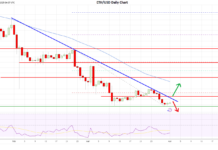YEREVAN (CoinChapter.com) — Ethereum, the second-largest cryptocurrency by market capitalization, is facing a critical juncture. Recent developments have highlighted the potential of the U.S. Securities and Exchange Commission (SEC) classifying its native crypto, Ether (ETH), as a security, prompting questions about investment risks in an environment of regulatory uncertainty.
The SEC’s Intensified Scrutiny
The SEC focused on Ethereum after it migrated from a Proof of Work (PoW) consensus mechanism, like Bitcoin’s, to a Proof of Stake (PoS) method. This major shift lets people earn by staking their Ether, similar to how one earns interest from bank accounts.
This change has kicked off a debate: Does Ethereum fit the Howey Test’s rules? This test helps decide if something is an investment contract under U.S. law.
Recent developments have put Ethereum’s legal status under the microscope. The New York Attorney General sued the cryptocurrency exchange KuCoin for offering ETH as an unregistered security. At the same time, comments from SEC Chairman Gary Gensler hinted that PoS assets, like Ethereum, could fall under the category of securities. These actions have heightened worries about Ethereum’s standing.

Market Reactions to Regulatory Uncertainty
Regulatory rumors have sent Ethereum’s market price on a rollercoaster. Furthermore, the buzz that the SEC might bring Ethereum under U.S. law caused a sharp price fall, showing just how nervously the market reacts to such news. This volatility puts a spotlight on the risks of investing in Ethereum, especially with the threat of SEC action hanging in the air.
This isn’t just talk; the question of Ethereum’s status as a security has big-time stakes for investors and the crypto world at large. If Ethereum gets tagged as a security, it would face strict rules, changing how it and its apps are traded and managed. This could jolt its market position, tip investor confidence, and twist the legal scene for digital assets.
Steering Through Uncertain Waters
As investors eye Ethereum, balancing the platform’s inherent value and potential against regulatory uncertainties becomes crucial. The ongoing debates around its legal and regulatory status underscore the delicate dance between crypto innovation and established regulatory boundaries. With outcomes still up in the air, the prospect of SEC action advises a prudent approach for those invested or considering an investment.
Grayscale’s Confidence in ETF Approvals
Grayscale believes that spot Ether (ETH) exchange-traded funds will receive the green light in May, despite recent buzz over the U.S. securities regulator’s “lack of engagement” with applicants.
“I don’t think perceived lack of engagement from regulators should be indicative of one outcome or another […] I personally am not deterred by it and believe the ETFs should be approved,”
Grayscale Chief Legal Officer Craig Salm

Salm mentioned that in the lead-up to the approval of spot Bitcoin ETFs, experts had already ironed out many issues that spot Ether ETFs are now facing. These tackled aspects like how to handle creation and redemption, the details of cash and in-kind models, ensuring asset protection, preventing losses, and managing custody.
Salm explained how, before spot Bitcoin ETFs got their approval, they tackled many similar issues that spot Ether ETFs face. They sorted out creation and redemption procedures and figured out cash and in-kind models. They addressed asset protection, loss prevention, and custody.
“So, the SEC has already been involved to a large extent,” he said. “Now, issuers find there’s less they need to talk about.”
“The case is just as strong as it was for spot #Bitcoin ETFs.”
Why is SEC Hesitant About Approving Ethereum ETF
ETF issuers aiming to add staking to their spot Ether ETFs face an extra challenge to work through with the regulator. This group includes Ark 21Shares, Fidelity, and Franklin Templeton.
Bloomberg ETF analysts Eric Balchunas and James Seyffart recently worried about the SEC’s “lack of engagement.” They’ve since lowered their expectations for a spot Ether ETF approval in May to just 25%.
On March 25, in a post on X, Balchunas described this 25% as “pessimistic.” He suggested the SEC’s silence might be “intentional” rather than just “delaying tactics.”

Salm noted that the recent nod to Ether Futures ETFs, regulated as commodity futures, puts spot Ether ETFs in a favorable spot for approval. This is because futures and spot products share a “high correlation.” Last week, Coinbase’s Paul Grewal and ex-CFTC Commissioner Brian Quintenz shared similar views.
Spot Ether ETF hopefuls include big names like BlackRock, VanEck, ARK 21Shares, Fidelity, Invesco Galaxy, Grayscale, Franklin Templeton, and Hashdex, all seeking the SEC’s green light.
The SEC’s deadline to make a call on VanEck’s application is May 23. Analysts anticipate that this date will bring clarity for all applicants.
The post Is Buying Ethereum Too Risky Against SEC’s Potential Crackdown? appeared first on CoinChapter.



